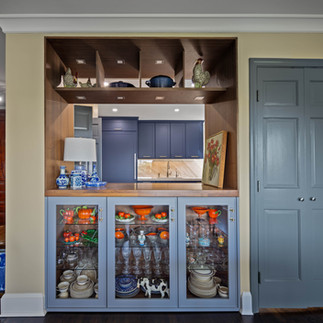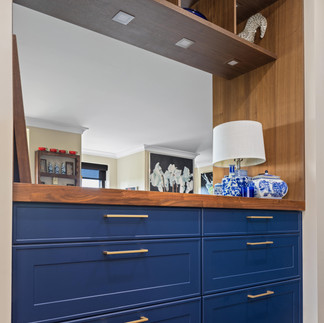The study of neuroaesthetics—how our brain responds to beauty, form, and design—guides us in creating spaces that are more than just functional. By applying neuroaesthetic principles, a kitchen can transform into a true zen kitchen, where harmony, calm, and stress reduction come naturally. Here’s how neuroaesthetics brings the essence of zen to kitchen design:
1. Visual Harmony and Flow for a Calming Kitchen
Proportions and Balance: Neuroaesthetics suggests that symmetry and balance are key to visual comfort. In a zen kitchen, this may mean harmonizing the layout of countertops, German kitchen cabinets, and appliances to create a balanced flow. For instance, balanced cabinetry or a central island can exude a sense of calm, helping reduce stress.
Color Psychology: Colors significantly impact mood and cognitive responses. For a calming kitchen, cool tones like blues and greens work well, evoking tranquility and focus. Warmer tones, like soft yellows or light browns, add warmth without overstimulating. Choosing the right color palette can transform the kitchen into a zen sanctuary.

Symmetrical & Balanced Contemporary Kitchen - Leicht's Luxury Black Kitchen
2. Ergonomics and Cognitive Ease to Reduce Kitchen Stress
Design for Flow: Reducing cognitive load is essential in creating a zen kitchen. Strategic placement of commonly used items and clear pathways—such as the “kitchen work triangle” layout—minimizes unnecessary movement, fostering a sense of ease of use and thereby reducing stress.
Material Selection: Materials can influence how we feel in the kitchen. Natural elements like wood and stone offer warmth, comfort, and a connection to nature, enhancing a zen ambiance. These materials provide a sense of grounding and provide a calming effect, reducing kitchen stress.
3. Lighting and Mood for a Zen Kitchen
Light and Shadow: Lighting impacts mood and perception. Neuroaesthetic research suggests that soft, diffused lighting can create a soothing atmosphere. A well-lit zen kitchen includes layers of lighting—ambient for relaxation, and task lighting for focus. Proper lighting that caters to different needs can dramatically de-stress your kitchen environment.
Luxe Kitchen - Leicht's Luxury Modern Kitchen Project
4. Nature and Biophilic Design for a Calming, Zen Kitchen
Connection to Nature: Neuroaesthetics and biophilic design emphasize the benefits of integrating nature into our surroundings. A zen kitchen that incorporates plants, wood finishes, or large windows with views of the outdoors creates a space that feels serene and alive and fosters a sense of well-being. This connection to nature is proven to lower stress and contribute to cognitive restoration.
5. Personalization and Emotional Resonance in Zen Kitchen Design
Personal Preferences: Another feature of Zen kitchens is the importance of personalization. Wouldn't you love working in a space that feels familiar and reflects your individual personality? Incorporating elements that resonate with you emotionally can make your space that much more soothing and a true joy to work in.
Artistry in the Kitchen - Leicht's Blue Cabinets
6. Multisensory Engagement in a Zen Kitchen
Aesthetic Experience Beyond Sight: Another important factor to consider is the sensory experience. A Zen kitchen is about more than just visual appeal—it’s about engaging all your senses. Adding decorative touches like softly glowing scented candles, a small vase of fresh flowers, or a delicate wind chime can create a soothing, multisensory environment that relaxes and inspires.
7. Well-Being and Stress Reduction in Kitchen Design
Reducing Stress and Anxiety: Neuroaesthetics prioritizes designs that foster mental well-being. A zen kitchen with a decluttered, spacious layout, clear surfaces, and organized storage encourages a sense of control and calm. This approach minimizes visual and physical chaos, reducing kitchen stress and enhancing emotional well-being.
Conclusion
In sum, neuroaesthetics provides insights that can transform a kitchen into a calming, zen sanctuary. By carefully choosing colors, materials, lighting, and layout, incorporating nature, and personalizing your space, you can create modern European kitchens that reduce stress and promote a tranquil, balanced environment—enhancing both the functionality and emotional appeal of the space. A zen kitchen isn't just a place to cook; it's a space designed to inspire peace and well-being every day.






